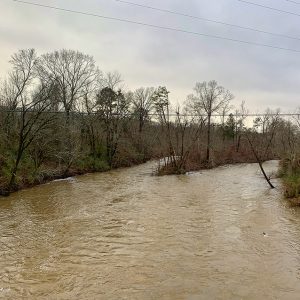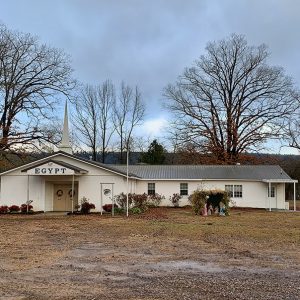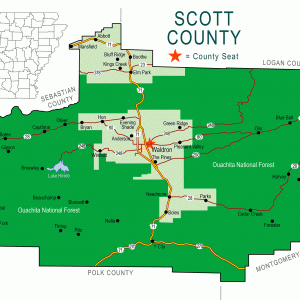calsfoundation@cals.org
Blue Ball (Scott County)
Blue Ball is an unincorporated community in eastern Scott County located on Highway 80. Blue Ball was established in 1873 along Dutch Creek. Blue Ball’s name originated from resident Salina Millard, who awoke on a cold morning and noticed how the mountain directly in front of her house looked like a large blue ball. The agriculture and timber industries have contributed to the economy and way of life in Blue Ball.
Prior to European exploration, the area surrounding Blue Ball was a wilderness. Several species of wildlife that no longer inhabit the area, such as elk and buffalo, were present throughout the region. Numerous archaeological sites and burial mounds are located along the banks of prominent waterways such as Dutch Creek. Archaeological findings have provided evidence of early inhabitants dating to the Archaic, Woodland, and Mississippian periods. Further archaeological evidence has indicated that the people of the Caddo tribe later inhabited the area.
During the late seventeenth and early eighteenth centuries, French hunters and tradesmen traveled west from the Arkansas Post, exploring portions of western Arkansas. These Frenchmen often traversed rivers and streams throughout the region. Several rivers that flow through Scott County were likely named by these French explorers, including the Petit Jean, Poteau, and Fourche La Fave Rivers. It is probable that they traveled along the Petit Jean River or Dutch Creek near present-day Blue Ball.
Settlers began arriving in the area now known as Blue Ball during the late 1830s and early 1840s. The area was settled throughout the early twentieth century.
Men called to fight in the Civil War served with both the Confederacy and Union. The women, children, and elderly were left to look after family homes and farms. Instances of bushwhacking occurred in the area during the war.
The Millard, Hunt, and Tate families were some of the first to settle in the area near Blue Ball. Robert N. Millard was a prominent farmer, merchant, and cotton ginner. He was born in 1844 in Arkansas to James E. Millard and Edna Millard. He began farming for himself in 1866 and married Elizabeth F. Weaver the same year. In 1868, Millard purchased forty acres of land and later added another 160 acres to it. On this land, he built five houses, a store building, and several barns. In 1871, he erected a gin, sawmill, and flouring mill with the help of his brother and brother-in-law. Millard later opened a general store. He also grew corn, cotton, and oats on his farm in Blue Ball.
The Hunt family is believed to have moved to Scott County around 1836. Hunt Township, where Blue Ball is located, is named for the family. Daniel Hunt moved with his family to Scott County from Indiana; he died sometime in the 1850s. One of Daniel’s sons, Wilson, was living in Lafave Township in 1850. By 1860, Wilson Hunt was married to Martha Hunt and had nine children. Wilson owned forty acres of farmland in Tate Township and died in the mid-1860s. Much of the Hunt family was later living in what is now Hunt Township near Blue Ball. One of Wilson Hunt’s sons, Ransom, enlisted in Cocke’s Arkansas Infantry of the Confederate Army in November 1863. Military records indicate that he was a private and later deserted in January 1864. According to family legend, Ransom was killed in a shootout with bushwhackers east of Blue Ball in 1864 while he was reportedly on furlough from the army.
The Tate family moved to Scott County from South Carolina and Alabama. The nearby community of Tatetown was named for the family, as was Tate Township. Thomas Henry Tate, whose family moved to Scott County prior to 1860, was born in Hunt Township in 1874. He later married Mary Ann Watson of Blue Ball in 1894. Thomas was a farmer and cattle buyer who also served as a U.S. marshal. He later became invested in the timber industry. Several Tate family members took in the children of W. P. George and Nancy S. George when they were killed by bushwhackers while making molasses during the Civil War.
The Blue Ball post office was established in 1873, with Robert N. Millard as the first postmaster.
Hunt Cemetery located near Blue Ball was named for the Hunt family who lived in the area and likely donated the land for it. The oldest marked grave in the cemetery dates to 1886, though the cemetery was likely established prior to that time.
Blue Ball School District (Number 75) was established circa 1900. The district was also known as Rocky Point. It was consolidated with the Waldron School District sometime between 1949 and 1953. The post office in Blue Ball was discontinued in 1955 and the mail sent to Waltreak in Yell County.
Around 1935, the Civilian Conservation Corps (CCC) built a powder magazineat Blue Ball for the storage of explosives used in bridge and road construction in the area. The company also worked on conservation projects, such as combatting soil erosion in the Ouachita National Forest.
Amber’s Café, which was once a popular eating establishment and pool hall, closed sometime in the early 2000s. By 2019, the Egypt Freewill Baptist Church was the only religious institution remaining directly in Blue Ball. Agriculture continues to be a prominent way of life in Blue Ball in the twenty-first century, mostly in the form of cattle and chicken farms. Timber is likewise logged throughout the Ouachita National Forest in the surrounding area. Hunting and fishing are popular recreational activities among residents.
For additional information:
Cate, Michael. History of Scott County, Arkansas. Dallas, TX: Curtis Media Corporation, 1991.
Echoes: The Scott County Historical and Genealogical Society Quarterly. Waldron, AR: Scott County Historical and Genealogical Society (1986–).
Goodner, Charles. Scott County in Retrospect. Mansfield, AR: Frank Boyd, 1976.
Goodner, Norman. A History of Scott County, Arkansas. Siloam Springs, AR: Bar D Press, 1941.
McCutcheon, Henry Grady. History of Scott County, Arkansas. Little Rock: H. G. Pugh and Company, 1922.
Ty Richardson
Richardson Preservation Consulting
 Amber's Cafe
Amber's Cafe  Dutch Creek
Dutch Creek  Egypt Freewill Baptist Church
Egypt Freewill Baptist Church  Scott County Map
Scott County Map 



Comments
No comments on this entry yet.